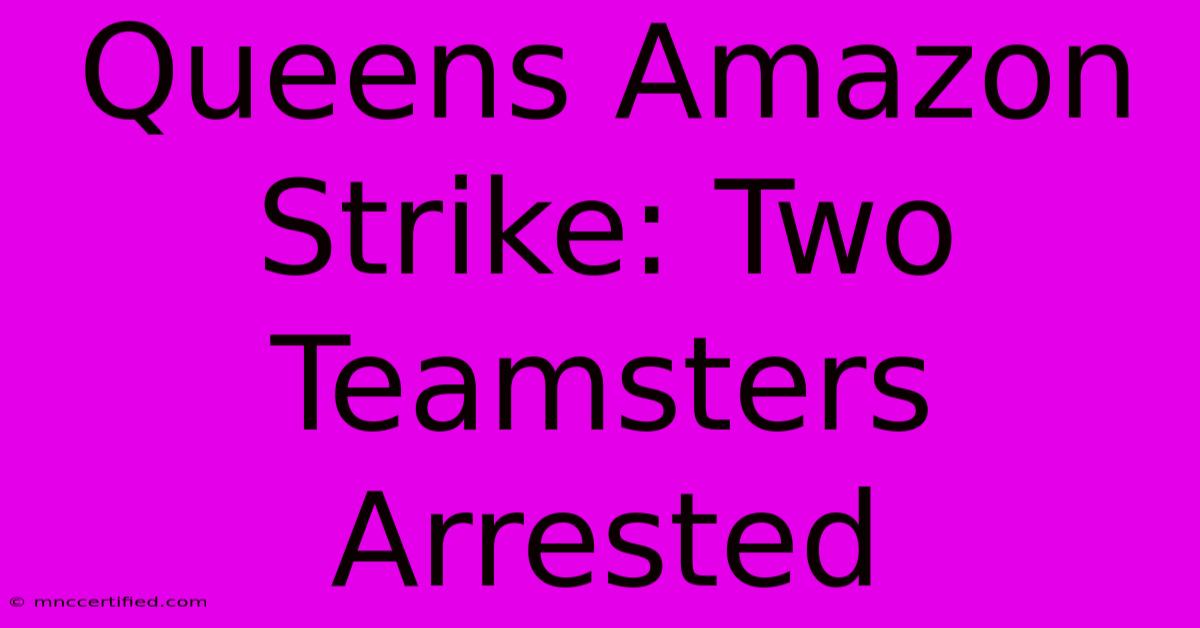Queens Amazon Strike: Two Teamsters Arrested

Table of Contents
Queens Amazon Strike: Two Teamsters Arrested – A Deep Dive into the Labor Dispute
The recent Amazon strike in Queens, New York, took a dramatic turn with the arrest of two Teamsters. This event highlights the escalating tensions between Amazon and its workers, raising crucial questions about labor rights, worker safety, and the power dynamics within the gig economy. This article will delve into the specifics of the strike, the arrests, and the broader implications for the future of labor relations.
The Queens Amazon Strike: A Timeline of Events
The strike, initially sparked by concerns over worker safety and fair wages, quickly gained momentum. Workers, primarily employed through third-party contractors, cited unsafe working conditions, inadequate compensation, and a lack of benefits as their primary grievances. The strike involved several Amazon facilities in the Queens area, significantly disrupting operations. Specific dates and the number of participating workers varied depending on the reporting source, but the overall impact on Amazon's distribution network was undeniable.
Key Issues Driving the Strike:
- Unsafe Working Conditions: Reports highlighted long hours, insufficient breaks, and a lack of adequate safety measures within the warehouses. This directly affected employee well-being and productivity.
- Wage Disparity: The workers argued that their wages were not commensurate with the demanding nature of their work, especially when compared to Amazon's overall profitability. This points to a larger conversation about fair compensation in the gig economy.
- Lack of Benefits: Many workers lacked access to health insurance, paid sick leave, and other essential benefits typically offered by larger employers. This created significant financial and health insecurities.
The Arrests: Charges and Implications
The arrest of two Teamsters, allegedly involved in the strike, significantly escalated the conflict. While the specific charges against them remain subject to ongoing investigation, the arrests are interpreted by many as an attempt by Amazon to suppress labor organizing. This action has raised concerns about the potential for union-busting and the limitations on workers' rights to protest.
Legal Ramifications and Public Response:
The arrests have sparked widespread outrage among labor activists and supporters of workers' rights. Many view the incident as an example of corporate overreach and an attempt to intimidate workers from exercising their legal rights to collective bargaining. The legal ramifications of the arrests are still unfolding, with potential challenges to the charges and ongoing legal battles likely.
The Broader Context: Amazon and Labor Relations
This incident is not an isolated event. Amazon has faced increasing criticism regarding its labor practices, including allegations of exploitation, suppression of unionization efforts, and a general disregard for worker well-being. The Queens strike and the subsequent arrests highlight the ongoing struggle between Amazon and its workforce, underscoring the need for stronger protections for gig workers and a reevaluation of labor relations in the modern economy.
Future Outlook: The Fight for Worker Rights Continues
The outcome of the legal proceedings and the long-term impact on Amazon's labor relations remain to be seen. However, this event serves as a powerful symbol of the growing movement for worker rights and the ongoing fight for fair wages, safe working conditions, and the right to organize. The debate surrounding the gig economy and its impact on worker well-being will undoubtedly continue.
Keywords:
Amazon strike, Queens, Teamsters, arrested, worker safety, fair wages, labor rights, union-busting, gig economy, exploitation, labor relations, worker well-being, collective bargaining, Amazon labor practices.
Note: This article provides a general overview of the situation. For the most accurate and up-to-date information, consult reputable news sources and official legal documents. The information presented here is for informational purposes only and does not constitute legal advice.

Thank you for visiting our website wich cover about Queens Amazon Strike: Two Teamsters Arrested. We hope the information provided has been useful to you. Feel free to contact us if you have any questions or need further assistance. See you next time and dont miss to bookmark.
Featured Posts
-
Putin Open To Trump Talks
Dec 20, 2024
-
Virgin River Season 6 Ending Breakdown
Dec 20, 2024
-
Neil Cavuto Exits Fox News After 28 Years
Dec 20, 2024
-
Tierney Return Celtic Eye Arsenal Star
Dec 20, 2024
-
Target Date Fund Efficiency A Balancing Act
Dec 20, 2024